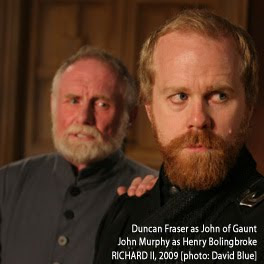Millie moves to New York in order to marry rich. After stopping a white slavery ring being run by her "Chinese" landlady, she does.
People who should see this show:
People who haven't seen it before.
Friends and family of the chorus.

The problem with reviewing this show is that I just saw it a few months ago for the first time.
Nothing compares to your first time.
My first James Bond was Timothy Dalton, followed by Roger Moore on video. When I see Sean Connery classics, I turn my nose up. He wasn't right. He wasn't first.
However, I am a very open-minded, mature, intelligent person. So when I went to the Playhouse's version of the Drowsy Chaperone, I accepted a pudgy narrator even though I'd already seen rake thin Bob Martin play the part in Toronto. I accepted an older Chaperone than Lisa Lambert, and realized that the rewrites had improved what I had always thought of as a perfect musical. So based on my clearly-evidenced mature mindset, I have decided that any comparison I make to the Theatre Under the Stars version is perfectly reasonable. And I will make a few of them.
Last time, Millie was played brilliantly by Diana Kaarina. This time, not-so brilliantly by Lauren Bowler. She mostly had the voice for it, and could dance, I suppose, but her acting -- not good. Really not good. In a show where the lead comes to New York full of hope and ambition, she gave Millie a jaded edge that made her drive to marry rich more cynical than cute. And her pacing was slow. So very slow and angry.
And then there was Millie's love interest, Jimmy Smith, played by Mat Baker. I think he thought he was in Days of Our Lives. Every time he walked on the stage, you could hear the whooshing sound of energy being sucked out of the theatre. However, his voice was gorgeous, and I would love to hear him sing again. Maybe not while he's acting, though.
Diana Kaarina, who played Millie so skillfully a few months ago, really fell flat this time. When I saw it done at Theatre Under the Stars, Miss Dorothy Brown, ably played by Meghan Anderssen, seemed like an important part of the story. Here she seemed like a minor character part, barely more important to the story than any of the girls in the hotel. Her voice was up to the challenge, though -- lovely soprano.
Gaelan Beatty did well as Millie's boss/stalking victim, Mr. Trevor Graydon, playing to his usual high standard. His voice was well matched to Kaarina's, and he owned every scene he was in.
Denis Simpson as Muzzy van Hossmere was a surprise, I have to say. In his first scene, I was fairly irritated; putting a man in a dress for a few laughs is cheap, in my opinion. The cross-casting did nothing to improve the play, instead distracting us from it and bringing us out of the moment. However, there was a payoff in the end, during the scenes between van Hossmere and Mrs. Meers.
And here is where the show was worth the money and then some. Irene Karas as Mrs. Meers, the landlady/ringleader of a white slavery outfit, was brilliant. Perfection. Completely different to the Meers of the Theatre Under the Stars production (Sarah Rodgers, whom I also enjoyed), she nailed every joke, and had a kick-ass voice to boot. It was also her perfect performance that has allowed me to forgive the racist elements in the show -- thank you, Irene.
The artistic team was not good, and I am beginning to be afraid that this is a frequent problem at the Gateway. Simon Johnston's direction was lackluster, seeming as though he was embarrassed by the pastiche of Millie. The elevator gag -- thrown away. The staging -- every scene and change looked the same. The subtitles -- yawn. With the exception of the two tap-dancers, the dancing was generally horrible; Kenneth Overbey's choreography looked all at once too complex and too simple. Jenifer Darbellay was clearly working within a budget for her costumes, but also hadn't thought them through. Dull colour palette on top of the even drearier tones of Drew Facey's set. I realize this is intended to make Millie stand out more, but in this case it just drew attention to her badly designed duds.
Don't go unless you haven't seen it before. Plays until January 3.
Some Highlights:
Irene Karas' Mrs. Meers: brilliant in every way
Gaelan Beatty's Mr. Trevor Graydon: very capably performed, with excellent diction in "The Speed Test"
"I'm Falling in Love with Someone": beautifully sung, particularly Diana Kaarina's soprano notes








